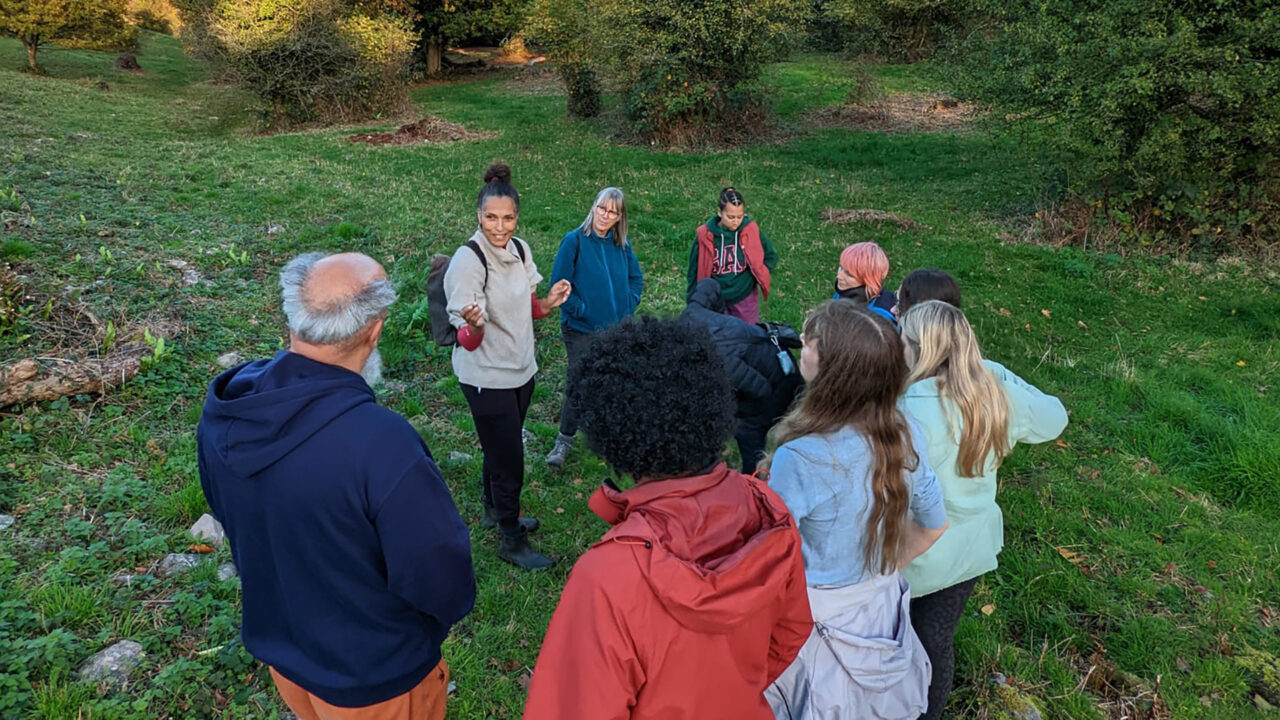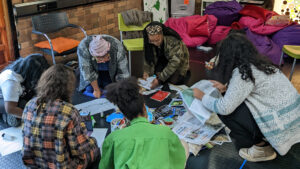- Posted on January 16th, 2024
Watershed and tiata fahodzi: Embedding Climate Justice into the Creative Sector

Watershed is an independent cinema and creative technology centre on Bristol’s historic harbourside.
About Watershed
At Watershed, our work is rooted in inclusivity. When we declared a climate emergency in 2019, we recognised how environmental action can reproduce exclusion if solutions aren’t designed with as many people as possible around the table – acknowledging this and working towards it is foundational to our climate work. We knew this aligned with the climate justice framework, but lacked understanding of how this could apply to the creative sector and organisations.
Black Earth: Resistance, Anti-Racism and the Environment
We funded Black Earth: Resistance, Anti-Racism and the Environment; our exploratory research project with tiata fahodzi, as we were both organisations who were united by our belief in recognising that climate change does not exist in a vacuum but is the symptom of larger systems of global inequality.
We understood climate justice as an important framework to guide designing climate solutions, but lacked context of what this could meaningfully look like in the creative sector.
Hence, our action research project initially aimed to bring together artists who identified as part of the global majority, to explore the complex intersections of racism, mental health and climate change and acts of creative resistance in this space. The project aimed to:
- Create much needed space for Global Majority artists to collectively explore these sprawling topics without KPIs or pre-intended outcomes restricting discussion.
- Explore what climate justice means to the creative community.
- As creative organisations, learn and understand how we can respond to the conversations and needs that arose in the explorations.
- Capture and share relevant learnings.
This project was a learning journey for all parties, and our main learning for creative organisations is that more space needs to be made for Global Majority artists to come, share, explore, digest, process and create together without expectation of outcome. The issues are sprawling and interconnected and so many of the artists in our workshop reflected they never had had time to explore and process these intersecting issues with others before, and therefore there was so much to unpack in each session.

Reflections
Our reflection is that the creative sector and organisations will not fix these deep systemic inequalities alone, nor is this work that can be done quickly. But by resourcing Global Majority artists to step into thought leadership in this space, we are working towards a creative climate action which is not only defined by carbon reductions but by how we change systems of inequality from the bottom up and middle out.
This is slow work and must be built into our programmes and operations in a meaningful way which is what we are committed to continue doing.
Learnings
The learnings from this project have directly influenced the design of our Grounding Technologies project, providing those active on climate across the West of England Combined Authority (WECA) region to develop ideas at the intersection of creative technology, climate action and community. For a just future, we need harmony between nature, technology and humanity – and wanted to resource the communities doing this work on the ground to be able to think how creative technology might support them. We learned from our Black Earth Project, that many Black and Brown folks who care deeply about the planet do not identify as climate activists as this has historically been an exclusionary space. So Grounding Technologies opened up its offer to anyone engaging in ‘action’, broadly defined – so we as funders could expand our notion of climate action through who we engaged with. This six-month pilot project is creating more thinking, processing and exploring space for those who need it.
We strive for inclusive climate decision making by mandating that all staff must undergo Carbon Literacy Training. This has several purposes: to help us identify and address blocks to environmental action at all levels of the organisation, to demonstrate our commitment to climate action at all levels, and to hear from all levels about climate decision making and solutions. We are now making a Small Projects Fund available to all who want to undertake climate action within their job role but may not have access to the budget to do so.
Lastly, this project has informed our thinking around our biggest carbon emitter – our building. It is Grade II listed and is an important part of Watershed’s identity, but it needs a radical retrofit in order to be thermally efficient and low carbon. We are taking this opportunity to consider how rethinking our building, and its structures, can be an ambitious, wild and generous offer to our city. How can our building be adapted to serve our ecosystem and communities better, and what does that look like in years to come? How can we future-proof the arts and culture offering into the future?
You can read tiata fahodzi producer Marcus’ article here with photos from our activities.
Further, one of our participants has returned to her home of Jersey and is running a programme inspired by Black Earth, responding to the local environmental and social issues felt by her community. She is using the Green Care Packages we produced to run the same exploration and healing activities with her community.
We have a strong partnership with tiata fahodzi and Watershed look to them as leaders in the creative climate justice space. In terms of this work, we actually felt the scale and differences between Watershed and TF (theatre vs cinema and creative technology, Watford vs Bristol) meant our climate justice activities might look quite different going forward as they should be locally rooted. There can be no one size fits all!
However, Black Earth’s producer Marcus Bernard has received funding as part of our Grounding Technologies programme with Chinonyerem Odimba (Artistic Director and CEO of tiata fahodzi) as an advisor on the project. This project explores how we can use creative technology to build a network of decolonial community apothecaries, building on some of the collaborations and learnings from the Green Care Packages of the Black Earth project.

Quotes from our programme participants:
“There are not many spaces where Black environmentalists can get together, talk and be in community with each other- that completely made the day. I also think the workshop was useful for getting us to think deeper about what climate justice looks like but also our actions and strategy for campaigning for it.”
“It was thought-provoking, and inspiring. I particularly found its approach engaging and hope we can continue developing the ideas and conversation during the workshop as well as the friendship both with the organisers and the participants.”
“It encouraged and allowed openness and spirit of comradeship and collectiveness which enriched and enhanced the experience of the workshop.”
“There needs to be more spaces for us to gather in that kind of communal way.”
“it was such a brilliant space and left me with more to consider about what we define as justice and the work we do as a collective.”
This case study was written by Watershed
